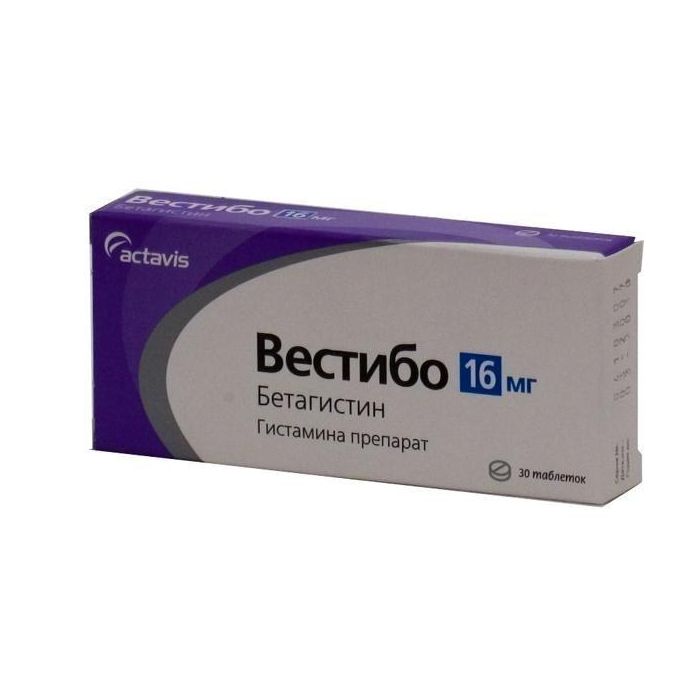betahistine | Vestibo tablets 16 mg 30 pcs.
Special Price
$33
Regular Price
$41
In stock
SKU
BID463865
Latin name
Vestibo
Vestibo
Latin name
Vestibo
Pharmacological action
Vestibo is a histamine-like, vasodilating.
Pharmacodynamics
It is a weak agonist of H1 receptors and a fairly potent antagonist of H3 receptors. Affects cochlear blood flow and the central vestibular apparatus. The action of betahistine includes: vasodilation in the inner ear (indirectly through H3 and H1 receptors), an inhibitory effect on vestibular nuclei (through H3 receptors) and the impulse activity of ampullary receptors. By direct agonistic action on the H1 receptors of the vessels of the inner ear and precapillary sphincters of the microvasculature located in the vascular strip (stria vascularis), as well as indirectly through the H3 receptors it improves microcirculation and capillary permeability, normalizes the pressure of the endolymph in the labyrinth and increases basilar artery. It has a pronounced central effect, being an antagonist of the H3 receptors of the vestibular nerve nuclei, it normalizes neuronal transmission in polysynaptic neurons of the vestibular nuclei at the level of the brain stem. By indirectly acting on H3 receptors, it increases the content of serotonin in the brain stem, which reduces the activity of the vestibular nuclei. Helps to eliminate disorders from both the vestibular and cochlear apparatus: reduces the frequency and intensity of dizziness, reduces tinnitus, helps to improve hearing in cases of decrease. It stimulates H1 receptors, therefore it does not have a sedative effect and does not cause drowsiness.
Pharmacokinetics
Absorbed rapidly, binding to plasma proteins is low. Cmax - 3 hours. It is almost completely excreted by the kidneys as a metabolite (2-pyridylacetic acid) within 24 hours. T1 / 2 - 3-4 hours.
Indications
dropsy of the labyrinth of the inner ear
vestibular and labyrinth disorders: dizziness, noise and pain in the ears, headache, nausea, vomiting, hearing loss, vestibular neuritis, labyrinthitis, benign position dizziness, dizziness () Meniere's disease.
As part of complex therapy: vertebrobasilar insufficiency
post-traumatic encephalopathy
cerebral arteriosclerosis.
Contraindications hypersensitivity
pheochromocytoma
asthma
peptic ulcer and
Special instructions
The therapeutic effect in some cases appears only a few months after the start of treatment.
Composition
1 tablet contains:
Active substance: betahistine dihydrochloride 16 mg
Excipients: povidone K90 MCC lactose silicon monohydrate dioxide colloidal crospovidone stearic acid purified water (not contained in the finished product).
Dosage and administration
Inside, with food, without chewing, with a small amount of liquid.
8-16 mg 2-4 times a day. The treatment is long.
Side effects
Dyspepsia (nausea, vomiting), skin rash, Quincke edema.
Overdose
Symptoms: headache, facial flushing, dizziness, tachycardia, decreased blood pressure, bronchospasm.
Storage Conditions
Store the product in a dry, dark place at a temperature not exceeding 22 РC.
Term hodnosty
2 years
active substance
Betahistine
Terms leave through pharmacies
In retseptu
lekarstvennaja tablet form
Prescribing
Adults as prescribed by a doctor
Indications
Indications
From Meniere's disease, Cerebrovascular disorders
Catalent Germani Schorndorf GmbH, Germany
Vestibo
Pharmacological action
Vestibo is a histamine-like, vasodilating.
Pharmacodynamics
It is a weak agonist of H1 receptors and a fairly potent antagonist of H3 receptors. Affects cochlear blood flow and the central vestibular apparatus. The action of betahistine includes: vasodilation in the inner ear (indirectly through H3 and H1 receptors), an inhibitory effect on vestibular nuclei (through H3 receptors) and the impulse activity of ampullary receptors. By direct agonistic action on the H1 receptors of the vessels of the inner ear and precapillary sphincters of the microvasculature located in the vascular strip (stria vascularis), as well as indirectly through the H3 receptors it improves microcirculation and capillary permeability, normalizes the pressure of the endolymph in the labyrinth and increases basilar artery. It has a pronounced central effect, being an antagonist of the H3 receptors of the vestibular nerve nuclei, it normalizes neuronal transmission in polysynaptic neurons of the vestibular nuclei at the level of the brain stem. By indirectly acting on H3 receptors, it increases the content of serotonin in the brain stem, which reduces the activity of the vestibular nuclei. Helps to eliminate disorders from both the vestibular and cochlear apparatus: reduces the frequency and intensity of dizziness, reduces tinnitus, helps to improve hearing in cases of decrease. It stimulates H1 receptors, therefore it does not have a sedative effect and does not cause drowsiness.
Pharmacokinetics
Absorbed rapidly, binding to plasma proteins is low. Cmax - 3 hours. It is almost completely excreted by the kidneys as a metabolite (2-pyridylacetic acid) within 24 hours. T1 / 2 - 3-4 hours.
Indications
dropsy of the labyrinth of the inner ear
vestibular and labyrinth disorders: dizziness, noise and pain in the ears, headache, nausea, vomiting, hearing loss, vestibular neuritis, labyrinthitis, benign position dizziness, dizziness () Meniere's disease.
As part of complex therapy: vertebrobasilar insufficiency
post-traumatic encephalopathy
cerebral arteriosclerosis.
Contraindications hypersensitivity
pheochromocytoma
asthma
peptic ulcer and
Special instructions
The therapeutic effect in some cases appears only a few months after the start of treatment.
Composition
1 tablet contains:
Active substance: betahistine dihydrochloride 16 mg
Excipients: povidone K90 MCC lactose silicon monohydrate dioxide colloidal crospovidone stearic acid purified water (not contained in the finished product).
Dosage and administration
Inside, with food, without chewing, with a small amount of liquid.
8-16 mg 2-4 times a day. The treatment is long.
Side effects
Dyspepsia (nausea, vomiting), skin rash, Quincke edema.
Overdose
Symptoms: headache, facial flushing, dizziness, tachycardia, decreased blood pressure, bronchospasm.
Storage Conditions
Store the product in a dry, dark place at a temperature not exceeding 22 РC.
Term hodnosty
2 years
active substance
Betahistine
Terms leave through pharmacies
In retseptu
lekarstvennaja tablet form
Prescribing
Adults as prescribed by a doctor
Indications
Indications
From Meniere's disease, Cerebrovascular disorders
Catalent Germani Schorndorf GmbH, Germany
Submit your review to Earn 10 Reward Points click here to login
Write Your Own Review

